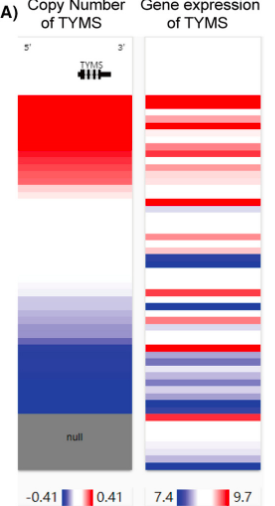Thymidylate synthase expression in breast cancer
Song S, Tian B, Zhang M, Gao X, Jie L, Liu P, & Li J. Diagnostic and prognostic value of thymidylate synthase expression in breast cancer. Clinical and Experimental Pharmacology and Physiology. (2020)
How they used Xena
They downloaded data from Xena to analyze offline and also included our Visual Spreadsheet in Figure 6.

Figure 6A
The relationship between thymidylate synthase (TYMS) expression and gene copy number in 46 breast cancer cell lines.
Paper
Nucleotide metabolism is the driving force of cell proliferation, and thymidylate synthase (TYMS) catalyzes a rate-limiting step in the initial synthesis of nucleotides. Previous studies reported that TYMS activity significantly affected the proliferation of tumour cells. However, the diagnostic and prognostic significance of TYMS expression in breast cancer remains unclear. Here, we used the Breast Cancer Integrative Platform (BCIP) to investigate the relationship between progression and prognosis of breast cancer with TYMS expression, and then verified the database analysis using immunohistochemical staining. Our results indicated TYMS expression was greater in breast cancer than adjacent normal tissues and greater in triple-negative breast cancer (TNBC) than non-TNBC tissues. TYMS expression also had significant positive correlations with histological grade, tumour size, and ER negativity, and PR negativity. The increased copy number of the TYMS gene appears to be the reason for its upregulation in breast cancer. Breast cancer patients with higher TYMS expression had poorer prognosis. Our data suggest that TYMS has potential use as a diagnostic and prognostic marker for breast cancer patients.